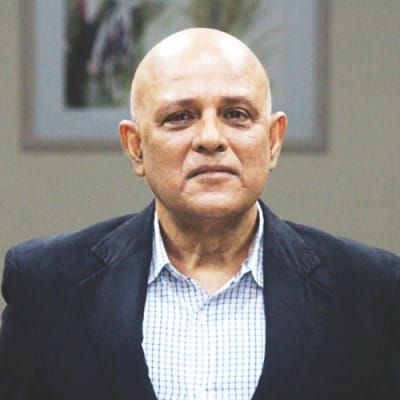Economists back WB’s GDP scenario

GDP growth projection logical
Ahsan H Mansur
Executive director of Policy Research Institute
The World Bank's projection on GDP growth for fiscal 2019-20 is logical as all economic activities have come to a halt. The GDP growth in the third and fourth quarters will be negative and the government should make an all-out effort to recover the economy from the stringent situation when the lockdown is lifted. A large number of people have already lost their jobs due to the ongoing economic fallout from the coronavirus pandemic. At least 4-5 crore people are struggling to survive their life due to the food shortage. The government should address the issue immediately, or else a social unrest will create. The government is yet to give any declaration on how to cater food to the people. Some relief works are being carried out by district and upazila administrations, but this is not enough at all given the going dreadful crisis. The government should form committee comprising local government representatives, eminent citizens, and staff of NGOs at village or union level to distribute the relief goods to the underprivileged people. The committee will monitor the relief programme in order to prohibit corruption. Both fiscal and monetary policies should be widened with a view to keeping the economy afloat. The government has already taken measures to expand its fiscal programmes by taking bailout packages, which is a time-befitting initiative. Expansionary monetary policy is also important at this moment as such stance help pump required money into the market.

Arresting downturn to rely on how fast govt responds
Khondaker Golam Moazzem
Research director of Centre for Policy Dialogue
The World Bank has made a dire projection about economic growth. And arresting the downturn in economic growth hangs on how fast the government responds with effective measures to address the Covid-19-induced health and economic emergency. Weakness in tackling the massive health risk will worsen the economic crisis. The ongoing shutdown has hit wide spectrum of the economy from exports, remittance, domestic economic activities to jobs and income, thus increasing the risk of worsening poverty. Some efforts to mitigate the negative impact on the economy are seen in the government's declared measures. But the big challenge is to ensure finances from banks as much as needed. Recovery and arresting the downfall will also depend on the types of steps the government takes to bail out millions of micro and small businesses in the informal sector. The risk of many people becoming poor is very high in the informal sector. More than 98 per cent of 78.18 lakh economic units represent cottage, micro and small-scale enterprises. And 80 per cent of workers in these firms are involved mostly on a full-time basis but largely without proper contracts. About 90 per cent of the firms have no VAT registration and are likely to be out of commercial banking facilities. Hence, these enterprises would find it difficult to get support under the bank-based revolving fund facility. The government may consider a third bailout package for informal sector enterprises along with other affected groups such as farmers to ensure cash flow. The government can also consider giving food and cash support to people in distress in urban areas.

GDP growth will fall drastically, no doubt
AB Mirza Azizul Islam
Former caretaker government adviser
There is no doubt that the country's GDP growth will decrease to a drastic level this fiscal year due to the ongoing shutdown. The government will have to take an expansionary budget to figure out the ongoing crisis. The volume of the social safety net and a good number of incentive measures should be taken on a priority basis.
There is no reason to be worried if deficit financing in the next fiscal year becomes wider than usual as this will help give a boost to the economy. But the government should avoid borrowing from the banking sources as it will put an adverse impact on the private sector.
Donation and soft loans should be mobilised from the foreign donors and multilateral agencies in order to tackle the situation.
The government should monitor the implementation of the bailout packages strictly so that no habitual defaulter manages to benefit from the programmes.

Projection ridiculous, ludicrous, done hastily
Prof Shamsul Alam
Member of General Economics Division
This is an undeveloped projection. The projection has been made too hastily. The coronavirus pandemic is still unfolding. It is so ludicrous as the projection has been made on an unfolding issue. This is ridiculous. We don't know what its impacts on the economy will be. The pandemic may last two months. Or it may last three months. So, we have to wait until it is over. Before the Covid-19 goes away, we can't make the projection. Definitely, it would have impact on the economy. The fallout may be higher or lower than we are expecting. Nobody can say how complex or devastating the situation will be. We don't know from what basis they have come up with the projection. We have been enforcing countrywide lockdown from March 26. Before that, the economy has been running as usual. Offices were open. Later, factories and industries were closed gradually and transport movement suspended. When the crisis will be over, we will assess the impacts of the coronavirus on the agriculture, industries and services sectors to come to a conclusion about the exact effects. We can't make this type of projection [World Bank's projection] in advance.

Economy to take at least 3 months to return to some normalcy
KAS Murshid
Director general of Bangladesh Institute of Development Studies
It is not possible to predict outright by what percentage the growth will fall. But it can be said that it will take a big hit. It would take at least three months for the economy to return to normalcy to some extent. After July, our economy will start picking up. But we do not know what the condition of the world economy will be. As the global economy has already entered into a recession, it will probably take time. Our recovery will not help much as Bangladesh's economy is also largely dependent on the global economy. Global component is very big in our economy. It is beyond my control. Domestic economy is in our control, particularly the service and agriculture sectors. We have to ensure normalcy in the service and agriculture sectors as quickly as possible. And it will only be possible when the challenge of the pandemic reduces to a large extent. Instant direct support will help affected businesses survive and the stimulus package will help other groups of businesses respond when right conditions return. A large portion of low-income people returned to their villages following the general holiday and shutdown. Yet there are still people in slums and measures should be taken to address the problems of the people living in slums. Arrangement should be there. NGOs and civil societies are trying to help the people living in the slums. But it seems to me that the initiatives are scattered. These good efforts and activities should be made useful. And coordination is needed to ensure good results. The government should come up to coordinate. If the government has any plan of its own, that should be included. There is huge energy among civil societies to help do voluntary activities. It is vital for the government to use this resource. Coordination through bureaucratic system will not be helpful. Rather, the government can form committees at local level involving public officials, civil society and private sectors to provide support.

 For all latest news, follow The Daily Star's Google News channel.
For all latest news, follow The Daily Star's Google News channel. 



Comments